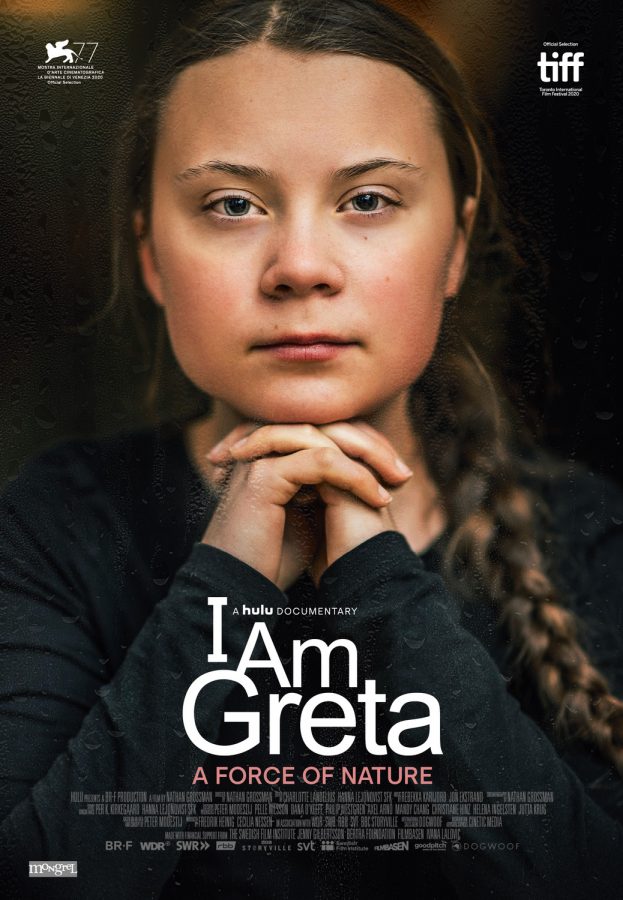“I am Greta”: A Hulu Documentary Review
May 12, 2021
Greta Thunberg, a climate activist from Stockholm, Sweden, has created a worldwide movement for the climate. “I Am Greta,” a documentary that was released on October 13, 2020 on Hulu, directed by Nathen Grossman and narrated by Greta, shows her side of her ongoing public fight for climate justice.
According to Yale Climate Connections, “Climate justice is a term, and more than that a movement, that acknowledges climate change can have differing social, economic, public health, and other adverse impacts on underprivileged populations.”
Nathen Grossman followed Thunberg in 2018, single-handedly shooting “I Am Greta,” for almost two years, capturing an inside look into her life and her fight for climate justice. Grossman began filming Thunberg when she began her school strike for the climate, alone, outside the Swedish parliament in Stockholm, showing how brave and courageous Thunberg is.
During the film, we get a look at Thunberg’s public fight as well as her private life. The documentary was mostly voiced over by Thunberg and at times in her native language, Swedish. Grossman was able to capture footage from her family, creating a deeply personal look into her world.
Throughout the documentary, Thunberg goes from country to country in Europe fighting for the climate. She visits the United Nations Climate Action Summit in New York City. Thunberg went to many meetings around Europe by train to help spread awareness of the climate crisis. Each speech she gave was deeply motivational, moving and each word had intensity. Thunberg was authoritative and held power in a room that was full of politicians, government officials, and activists.
“I don’t want you to listen to me, I want you to listen to the science,” says Greta.
Worldwide, Thunberg was able to bring people together through peaceful, yet powerful protests against the climate crisis. The largest protest was held in New York City. Thunberg came to New York City by boat from Plymouth, England. The trip took multiple days through harsh winds and roaring waters. On September 20, 2019, almost 60,000 people protested in Manhattan and almost 7 million people around the world.
It’s known as the “Fridays for Future Campaign.” Students and young adults take off of school or work to protest for the climate and to make their voices heard. Young people at the protest accused adults of letting them down on the most important issue of their generation and those generations yet to come, the climate.
Another aspect of Greta’s life that is touched upon in the documentary is how she handles living with her disability, Asperger’s syndrome. Asperger’s syndrome is a condition on the autism spectrum. According to the APA Dictionary of Psychology, Aspberger’s is “a disorder associated with varying degrees of deficits in social and conversational skills, difficulties with transitions from one task to another,” but does not present cognitive deficits. Thunberg struggled with writing speeches and tended to fixate on grammatical errors, making her frustrated.
I highly recommend watching the documentary, it was informative and deeply motivating, showing her passion for the climate. Grossman’s camera work was well done, capturing the Thunberg family. “I Am Greta” is, in a way, like a coming of age film, that begins with Thunberg being introverted and quiet. But through her climate movement she meets and sees more people who believe in the climate crisis, and this truly helps her find her place in the world.
During the coronavirus pandemic, it created a unique challenge for Thunberg, whose “Fridays for Future” campaign had evolved into largely in-person gatherings and had to stop. Thunberg spoke to BBC on what she had been doing in 2021. There was no compulsory lockdown in Sweden during the COVID-19 pandemic, therefore she was able to continue her fight for the climate there.
Thunberg told People magazine “My hope for 2021 is that we see an awakening when it comes to the climate and environment, [and] that we start to treat this crisis like the crisis it is and understand what needs to be done— understand that we have failed and that we need to take real bold action right now, that we cannot afford to wait any longer.”
The Swedish climate activist donated $1 million to people who were affected by climate change and the COVID-19 pandemic. Thunberg won this money from the Gulbenkian Prize for Humanity, an annual reward of 1 million euros that recognizes people and organizations around the world. Greta is working to help organizations and projects that work towards a sustainable future.
The documentary ended on a hopeful note, that the world will finally see the real issue of climate change. In the final scenes of the film, it shows Thunberg with her beloved pony. “I sometimes think it might be good if everyone had a little bit of Asperger’s,” she says as she grooms him, “…at least when it comes to the climate.”

